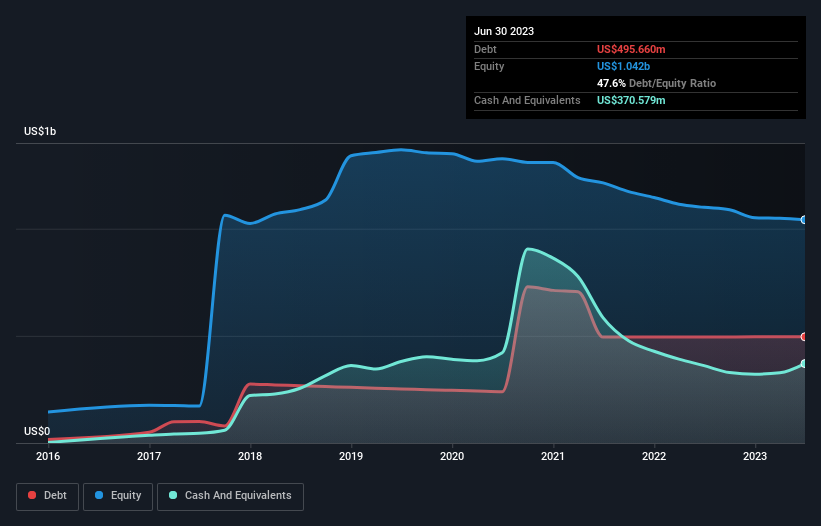- United States
- /
- Interactive Media and Services
- /
- NasdaqGS:ANGI
Angi (NASDAQ:ANGI) Is Carrying A Fair Bit Of Debt
David Iben put it well when he said, 'Volatility is not a risk we care about. What we care about is avoiding the permanent loss of capital.' It's only natural to consider a company's balance sheet when you examine how risky it is, since debt is often involved when a business collapses. Importantly, Angi Inc. (NASDAQ:ANGI) does carry debt. But should shareholders be worried about its use of debt?
When Is Debt Dangerous?
Debt and other liabilities become risky for a business when it cannot easily fulfill those obligations, either with free cash flow or by raising capital at an attractive price. In the worst case scenario, a company can go bankrupt if it cannot pay its creditors. However, a more frequent (but still costly) occurrence is where a company must issue shares at bargain-basement prices, permanently diluting shareholders, just to shore up its balance sheet. Of course, plenty of companies use debt to fund growth, without any negative consequences. The first thing to do when considering how much debt a business uses is to look at its cash and debt together.
See our latest analysis for Angi
What Is Angi's Debt?
As you can see below, Angi had US$495.7m of debt, at June 2023, which is about the same as the year before. You can click the chart for greater detail. However, because it has a cash reserve of US$370.6m, its net debt is less, at about US$125.1m.

How Healthy Is Angi's Balance Sheet?
According to the last reported balance sheet, Angi had liabilities of US$303.4m due within 12 months, and liabilities of US$556.9m due beyond 12 months. On the other hand, it had cash of US$370.6m and US$78.5m worth of receivables due within a year. So it has liabilities totalling US$411.3m more than its cash and near-term receivables, combined.
While this might seem like a lot, it is not so bad since Angi has a market capitalization of US$815.1m, and so it could probably strengthen its balance sheet by raising capital if it needed to. But it's clear that we should definitely closely examine whether it can manage its debt without dilution. There's no doubt that we learn most about debt from the balance sheet. But it is future earnings, more than anything, that will determine Angi's ability to maintain a healthy balance sheet going forward. So if you're focused on the future you can check out this free report showing analyst profit forecasts.
Over 12 months, Angi made a loss at the EBIT level, and saw its revenue drop to US$1.7b, which is a fall of 6.7%. We would much prefer see growth.
Caveat Emptor
Importantly, Angi had an earnings before interest and tax (EBIT) loss over the last year. To be specific the EBIT loss came in at US$73m. Considering that alongside the liabilities mentioned above does not give us much confidence that company should be using so much debt. So we think its balance sheet is a little strained, though not beyond repair. We would feel better if it turned its trailing twelve month loss of US$101m into a profit. So to be blunt we do think it is risky. The balance sheet is clearly the area to focus on when you are analysing debt. But ultimately, every company can contain risks that exist outside of the balance sheet. To that end, you should be aware of the 1 warning sign we've spotted with Angi .
If you're interested in investing in businesses that can grow profits without the burden of debt, then check out this free list of growing businesses that have net cash on the balance sheet.
New: Manage All Your Stock Portfolios in One Place
We've created the ultimate portfolio companion for stock investors, and it's free.
• Connect an unlimited number of Portfolios and see your total in one currency
• Be alerted to new Warning Signs or Risks via email or mobile
• Track the Fair Value of your stocks
Have feedback on this article? Concerned about the content? Get in touch with us directly. Alternatively, email editorial-team (at) simplywallst.com.
This article by Simply Wall St is general in nature. We provide commentary based on historical data and analyst forecasts only using an unbiased methodology and our articles are not intended to be financial advice. It does not constitute a recommendation to buy or sell any stock, and does not take account of your objectives, or your financial situation. We aim to bring you long-term focused analysis driven by fundamental data. Note that our analysis may not factor in the latest price-sensitive company announcements or qualitative material. Simply Wall St has no position in any stocks mentioned.
About NasdaqGS:ANGI
Angi
Angi Inc. connects home professionals with consumers in the United States and internationally.
Undervalued with excellent balance sheet.
Similar Companies
Market Insights
Community Narratives




